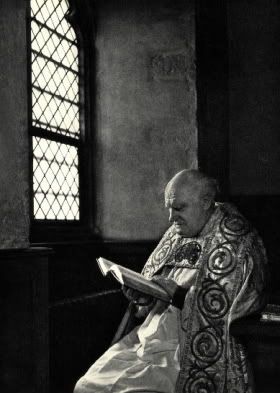
The Most Rev'd and Rt Hon Lord Arthur Michael Ramsey,
100th Archbishop of Canterbury
Here is an excerpt from the classic book by Dr. Ramsey, of recent memory, called The Gospel and the Catholic Church [pp 65-67].
The study of the historical death and resurrection of Jesus has led us to the study of the Apostolic Church, and thence, in one organic movement, to the study of "Catholicism." The impact of the Gospel has led on to the structure of the Church. What, then, is the relation between the Gospel and "Catholicism ?" It seems impossible to understand them separately. For we cannot appeal back to the authority of Jesus Christ without being led to face the Church and its outward marks. To know Jesus we must pass beyond His life and example to His death and resurrection, and these events were intelligible only through the scriptures which foretold them and through the Apostles who shared in them when they died with Christ and were raised together with Him. This dying and rising means the one Body; we know Christ through dying in its one life, and the marks of the Church help us to die by pointing us to the universal family whose membership is death and life in Christ.
In short, the only appeal back to Jesus which is logically and spiritually coherent is an appeal to the Gospel of God uttered in the one Body by its whole structure. However much it may have suffered perversion in history, this structure proclaims the Gospel by pointing men beyond this or that experience, this or that achievement, this or that movement or revival, to the universal society in which all these are made full. If we would draw near to the naked facts of Calvary and Easter, we can do so only in the one fellowship whose very meaning is death to self.
The Catholicism, therefore, which sprang from the Gospel of God is a faith wherein the visible and ordered Church fills an important place. But this Church is understood less as an institution founded upon the rules laid down by Christ and the Apostles than as an organism which grew inevitably through Christ's death and resurrection. The Church, therefore, is defined not in terms of itself, but in terms of Christ, whose Gospel created it and whose life is its indwelling life.
But the Church's order does not imply that those who possess it are always more godly than those who are without it. For it does not bear witness to the perfection of those who share in it, but to the Gospel of God by which alone, in one universal family, mankind can be made perfect. It is not something Roman or Greek or Anglican; rather does it declare to men their utter dependence upon Christ by setting forth the universal Church in which all that is Anglican or Roman or Greek or partial or local in any way must share by an agonizing death to its pride.
Many fruits of the Spirit will be found apart from the full Church order; yet those fruits and all others will grow to perfection only through the growth of the one Body in which Christ is all in all fulfilled, and it is the Church order that in every age bears witness to this one Body of which every movement, experience, "ism," achievement, must know itself to be a fragmentary part.
To assert that Church order is thus related to the Gospel is unpopular in many modern theological circles. It is widely assumed that a deeper understanding of that Gospel brings an indifference to Church order. But Baptism and Episcopacy are part of the utterance of God’s redemptive love, and they proclaim that men’s love is made perfect only by the building up of the one Body in which alone, by the due working of all its parts, the truth that is in Jesus is fully learnt.


No comments:
Post a Comment